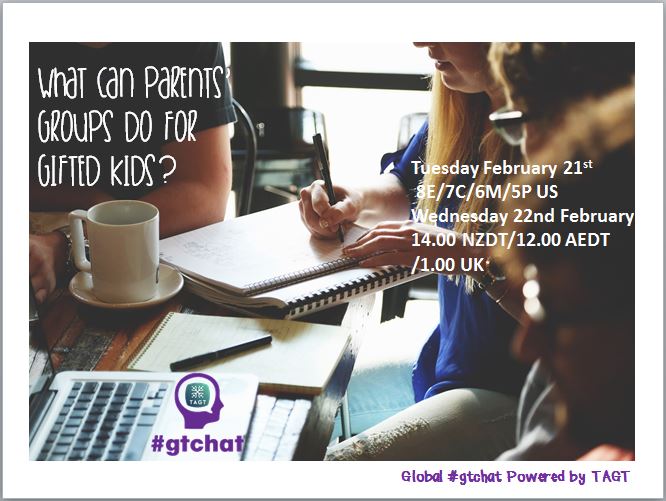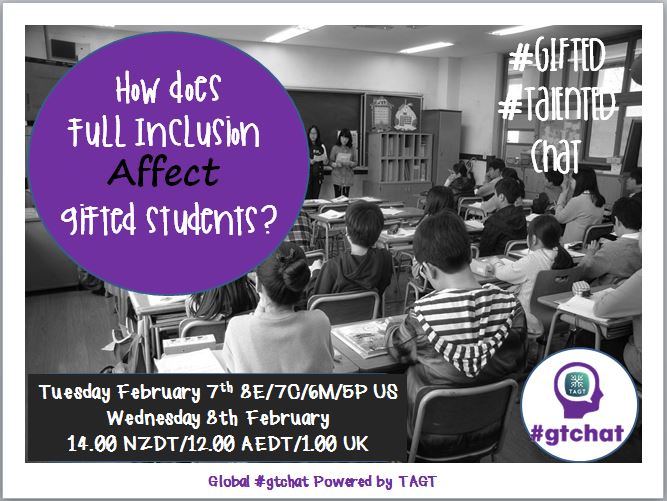
Starting a Parent Group for Gifted Kids can be a daunting task, but the rewards are many. Parent groups should mainly be in support of their children, but a bonus is to be able to support each other. Parenting gifted children can be extremely stressful and lonely. Parents need to know that they don’t have to re-invent the wheel. Parent groups can assist teachers and schools; such as coaching academic competitions, leading after-school programs.
The structure of the group (local, online, blended) can have an affect on the gifted children of its members. Parent group structure should be matched to the needs of the local area; ie, rural schools might prefer face-to-face meetings while urban areas might find online meetings more convenient. Certain activities undertaken by parent groups might dictate group structure; fundraising, competitions, or extracurricular activities. Online structures can provide special opportunities for gifted kids to participate in global activities; make new friends.
How can parents combine building support for a new parent group and providing options for their children? Weekend and extracurricular activities for kids provide great networking opportunities for parents. Parents can volunteer to act as coaches and judges on school teams while getting to know other parents of gifted kids.
Most gifted parent groups initially start as support groups, but evolve into advocacy groups as children’s needs are realized. Parent groups need to collaborate with school committees, advisory boards and other parent groups to develop advocacy.
There are many activities that parent groups of gifted kids can support. They can help start clubs (ex.: chess)and set-up Super Saturdays for kids to meet peers and have fun. Parent groups can provide coaches for groups such as Destination Imagination, Lego First Leagues, and Odyssey of the Mind.
Where can parent groups find support and information from state and national organizations? Most states have gifted organizations that can be found via a Google search. Some national groups include the NAGC, SENG, and Gifted Homeschoolers Forum in the U.S. and Potential Plus UK in the UK.
Ultimately, parents groups for gifted kids benefit all stakeholders – the student, the parents, and the school. It’s a lot of work, but well worth it. A transcript of this chat may be found at Storify.

Global #gtchat Powered by the Texas Association for the Gifted and Talented is a weekly chat on Twitter. Join us Tuesdays at 8E/7C/6M/5P in the U.S. and Wednesdays at 14.00 NZST/12.00 AEST/1.00 UK to discuss current topics in the gifted community and meet experts in the field. Transcripts of our weekly chats can be found at Storify. Our Facebook Page provides information on the chat and news & information regarding the gifted community. Also, checkout our Pinterest Page and Playlist on YouTube.
 About the author: Lisa Conrad is the Moderator of Global #gtchat Powered by TAGT and Social Media Manager of the Global #gtchat Community. She is a longtime advocate for gifted children and also blogs at Gifted Parenting Support. Lisa can be contacted at: gtchatmod@gmail.com
About the author: Lisa Conrad is the Moderator of Global #gtchat Powered by TAGT and Social Media Manager of the Global #gtchat Community. She is a longtime advocate for gifted children and also blogs at Gifted Parenting Support. Lisa can be contacted at: gtchatmod@gmail.com
Links:
Ten Suggestions for Parents of Gifted Children (pdf)
Starting & Sustaining a Parent Group to Support Gifted Children (pdf)
Effective Advocates: Find “Kindred Spirits”
Meeting Needs of High Ability & High Potential Learners in Middle Grades (pdf)
High-Potential Students Thrive when School Districts Develop Sustainable Gifted Services
Care & Feeding of Gifted Parent Groups: Guide for Gifted Coordinators, Teachers & Parent Advocates (pdf)
Gifted Parent Groups: The SENG Model
The Value of Parent Support Groups
Power in Numbers: How Gifted Advocacy Parent Groups Can Help You & Your Kids
Dear Gifted Parent: A Letter from an Educator
Starting a Gifted Parent Group
Starting a Gifted Parents’ Group
Cybraryman’s Parent Involvement Page
Cybraryman’s Gifted and Talented Page
UT High School GT Professional Development
Start a Support Group for Parents of Gifted Kids
NAGC’s 2014-2015 State of the States in Gifted Education
Parent Resources from TAGT:
Parent Support Groups in Texas
Photo courtesy of Pixabay CC0 Public Domain
Graphic courtesy of Lisa Conrad.


